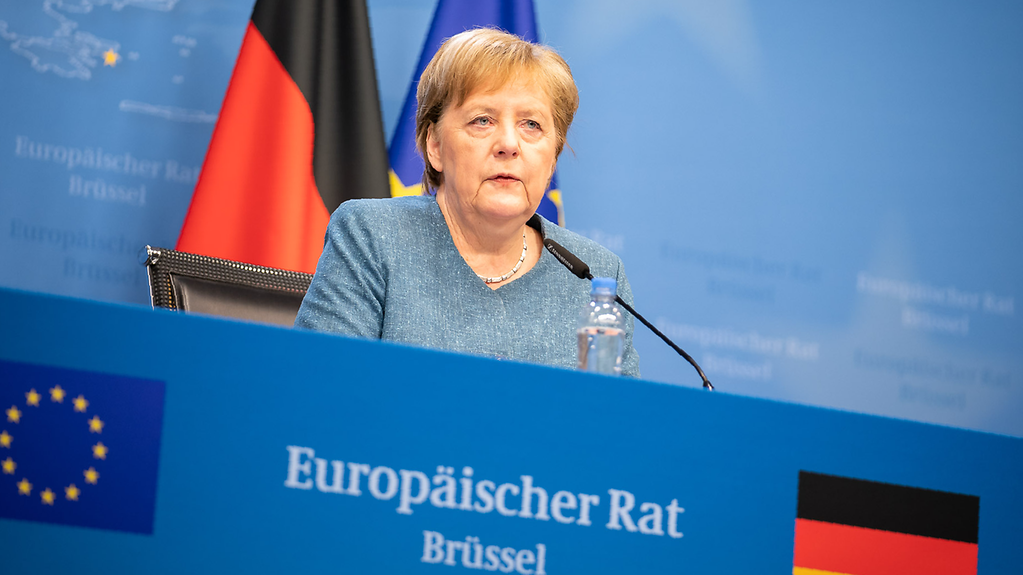Chancellor Angela Merkel at the European Council meeting
In the wake of the most recent events in Belarus, the EU heads of state and government have decided to impose additional sanctions on the country. They demanded the release of blogger Roman Protasevich and his partner. Also on the agenda were Russia, climate action and the COVID-19 pandemic. Chancellor Angela Merkel said discussions were constructive and purposeful. “That also shaped the nature of this Council meeting.“
4 min reading time

The EU has responded swiftly and decisively to events in Belarus, said Chancellor Angela Merkel, after the European Council meeting in Brussels.
Photo: Bundesregierung/Kugler
The informal meeting of the European Council in Brussels was intended to focus primarily on climate action, the COVID-19 pandemic, and foreign policy matters. In view of events, however, the heads of state and government of the European Union first turned their attention to another matter on Monday evening – a European response to the most recent events in Belarus. At the end of the meeting, Chancellor Angela Merkel expressed her concern over events in conjunction with the arrest of journalist Roman Protasevich.
On Sunday, authorities in Belarus forced a Ryanair flight en route from Greece to Lithuania to land in Minsk, having scrambled a fighter jet to escort the plane. On board was the blogger Roman Protasevich, who is wanted by the leaders of the country. Shortly after the aircraft landed in Minsk he was arrested.
International Civil Aviation Organization to investigate incident
On Tuesday, Chancellor Angela Merkel declared that the European Council had condemned the action in the strongest possible terms and demanded the immediate release of Roman Protasevich and his partner. The International Civil Aviation Organization has also been requested to urgently investigate this “unprecedented” and “unacceptable” incident.
The heads of state and government also decided to ban Belarus airlines from EU airspace. These airlines will no longer be allowed to take off or land in the EU. The member states agreed on additional economic sanctions and instructed the foreign affairs ministers to put additional individuals and organisations on the sanctions list.
Strategic debate on Russia
The heads of state and government also discussed the EU’s relations with Russia. The discussion will be continued in more depth on the basis of a report prepared by the European Commission and the European External Action Services at the European Council meeting in June. “We agreed that we must respond together in a coordinated manner to Russian politics,” reported the Chancellor. Obviously, she explained, the EU must also “develop a common vision of the sort of relations we envisage”.
In a statement the heads of state and government condemned the “illegal, provocative and disruptive Russian activities against the EU, its member states and beyond”. It reaffirms the EU’s unity and solidarity in the face of such acts, as well as its support to Eastern partners.
“I think we have responded immediately and also decisively,” said Chancellor Angela Merkel. The discussions on Belarus and Russia were constructive and purposeful. “That also shaped the nature of this Council meeting.”
Middle East, United Kingdom, USA
The recent flare up in the Middle East conflict was also on the agenda. The European Council welcomed the ceasefire that is designed to put an end to the violence. The heads of state and government reaffirmed their firm commitment to a two-state solution.
The European Council discussed relations with the United Kingdom post-Brexit – especially with a view to Northern Ireland. The EU heads of state and government called for the full implementation of the withdrawal agreement. The EU-US summit on 15 June was another topic on the agenda.
COVID-19 pandemic
On Tuesday morning the pandemic was on the agenda of the European Council. The heads of state and government welcomed agreement on a digital COVID certificate. “There’s still work to be done” to realise this in practice, and Germany too is working towards this goal, said Angela Merkel. “But the legal basis is now in place, and that is important.” In view of the emergence of new variants, the EU must ensure a “faster and more coordinated” response said the Chancellor. That is why it is a good thing that the Council last week agreed on a mechanism that will provide for a swift, coordinated response to new variants.
The heads of state and government addressed the issue of vaccine distribution. “We know that if we are to get the pandemic under control globally, everyone must be given the opportunity to be vaccinated,” stressed Angela Merkel. The European Union is a good example. A large percentage of the vaccine manufactured in the EU is exported to third states.
At the G20 Global Health Summit in Rome last Friday, the EU pledged to donate a minimum of 100 million vaccine doses to third states by the end of 2021. Angela Merkel reminded her audience that she had pledged that Germany will provide 30 million of these doses.
EU climate policy
On Tuesday afternoon, the focus was on climate action. The European Commission is currently drawing up its “Fit for 55” climate package, which it will present on 14 July. Commission President Ursula von der Leyen explained the wide spectrum to be covered by the legislative package, reported the Chancellor. An initial orientation discussion had been held, and proposals are now awaited, she said. “The interim step was important to allow everyone to express their national expectations of the Commission’s package.”
In December 2020 the European Council decided that greenhouse gas emissions were to be reduced by a minimum of 55 per cent of the 1990 levels by 2030. The package will affect many areas, including the EU’s emissions trading system, the Renewable Energy Directive and the fleet limit values for passenger car fleets.